Summary
Revista Brasileira de Ginecologia e Obstetrícia. 2024;46:e-rbgo61
Endometrial cancer (EC) is a heterogeneous disease with recurrence rates ranging from 15 to 20%. The discrimination of cases with a worse prognosis aims, in part, to reduce the length of surgical staging in cases with a better prognosis. This study aimed to evaluate the association between Insulin-like growth factor II mRNA-binding protein 3 (IMP3) expression and prognostic and morphological factors in EC.
This retrospective, cross-sectional, analytical study included 79 EC patients - 70 endometrioid carcinoma (EEC) and 9 serous carcinoma (SC) - and 74 benign endometrium controls. IMP3 expression was evaluated by immunohistochemistry-based TMA (Tissue Microarray), and the results were associated with morphological and prognostic factors, including claudins 3 and 4, estrogen and progesterone receptors, TP53, and KI67.
IMP3 expression was significantly higher in SC compared to EEC in both extent (p<0.001) and intensity (p=0.044). It was also significantly associated with worse prognostic factors, including degree of differentiation (p=0.024, p<0.001), staging (p<0.001; p<0.001) and metastasis (p=0.002; p<0.001). IMP3 expression was also significant in extent (p=0.002) in endometrial tumors compared with controls. In addition, protein TP53 and KI67 showed significant associations in extent and intensity, respectively.
IMP3 expression was associated with worse prognostic factors studied. These findings suggest that IMP3 may be a potential biomarker for EC poorer prognosis.
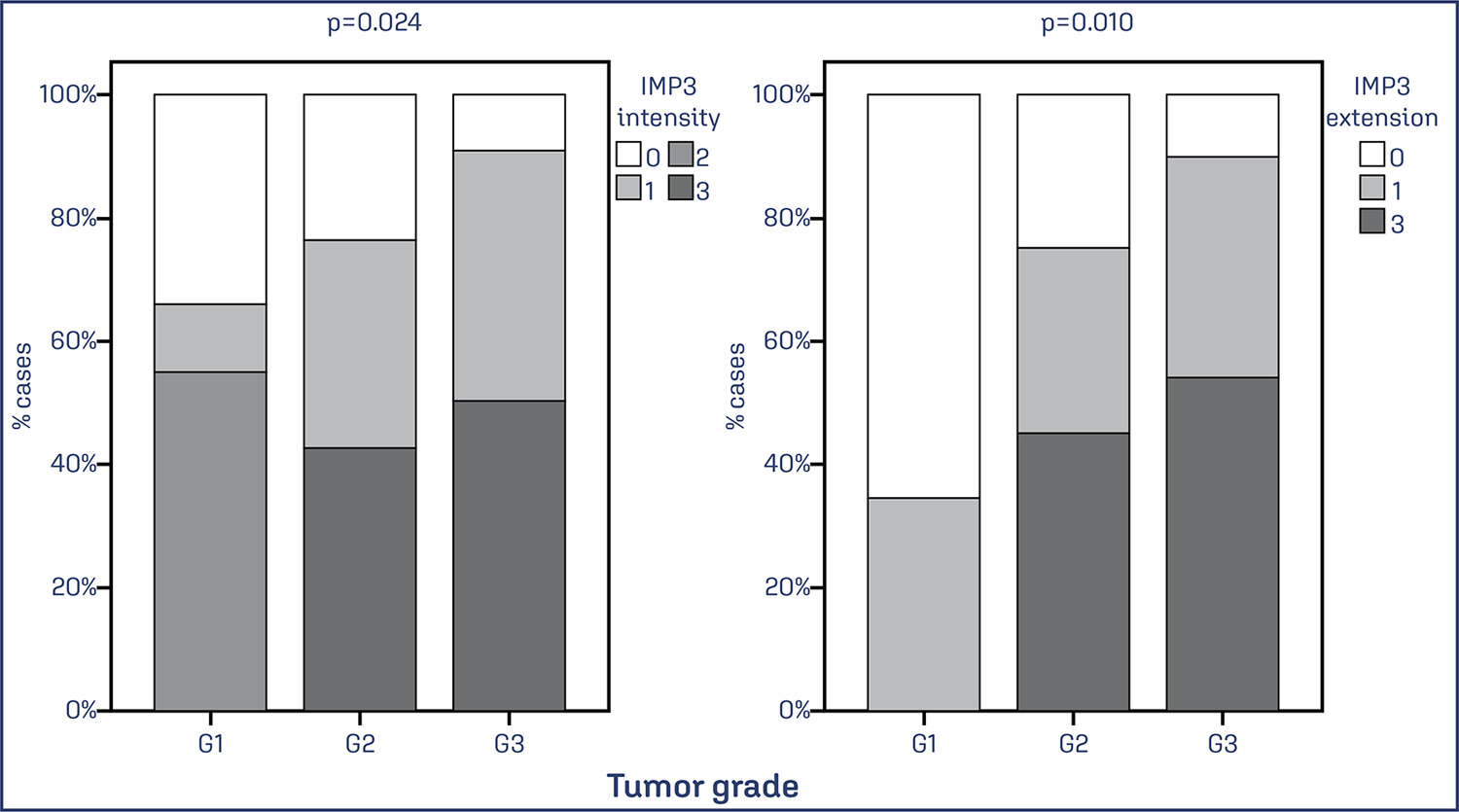
Summary
Revista Brasileira de Ginecologia e Obstetrícia. 2024;46:e-rbgo62
To report the prevalence of malignant transformation of vulvar lichen sclerosus (VLS) and possible risk factors.
This is a cohort study with data analysis from medical records of 138 patients with histological diagnosis of VLS registered at the Vulvar Pathology Outpatient Clinic of the University Hospital, between 2007 and 2017. Predominance of risk factors was performed using logistic regression analysis. The variables studied were the length of follow-up, age, regular or irregular follow up; presence of symptoms (dyspareunia, pruritus and/or vulvar burning); histology characteristics, the presence of epithelial hyperplasia; and the presence of autoimmune diseases.
There were 138 patients included in the study, and among them five progressed to malignant transformation. The patients had a median age of 59 years and 83% were symptomatic. The most frequent symptom was itching with 72%. Autoimmune diseases were present in 11.6%, the most prevalent being thyroid disease. All five case of malignant transformation (0.6%) had an irregular follow up. The logistic regression analysis was used among the studied variables, and no statistical significance was found among them (p ≥ 0.05). The relationship between hyperplasia and the clinical outcome of malignant transformation, in which non-significant but acceptable p value close to 0.05 was observed.
The prevalence of malignant transformation in patients with VLS was 0.6%, and common factors were the lack of adherence to medical treatments and the loss of follow-up.
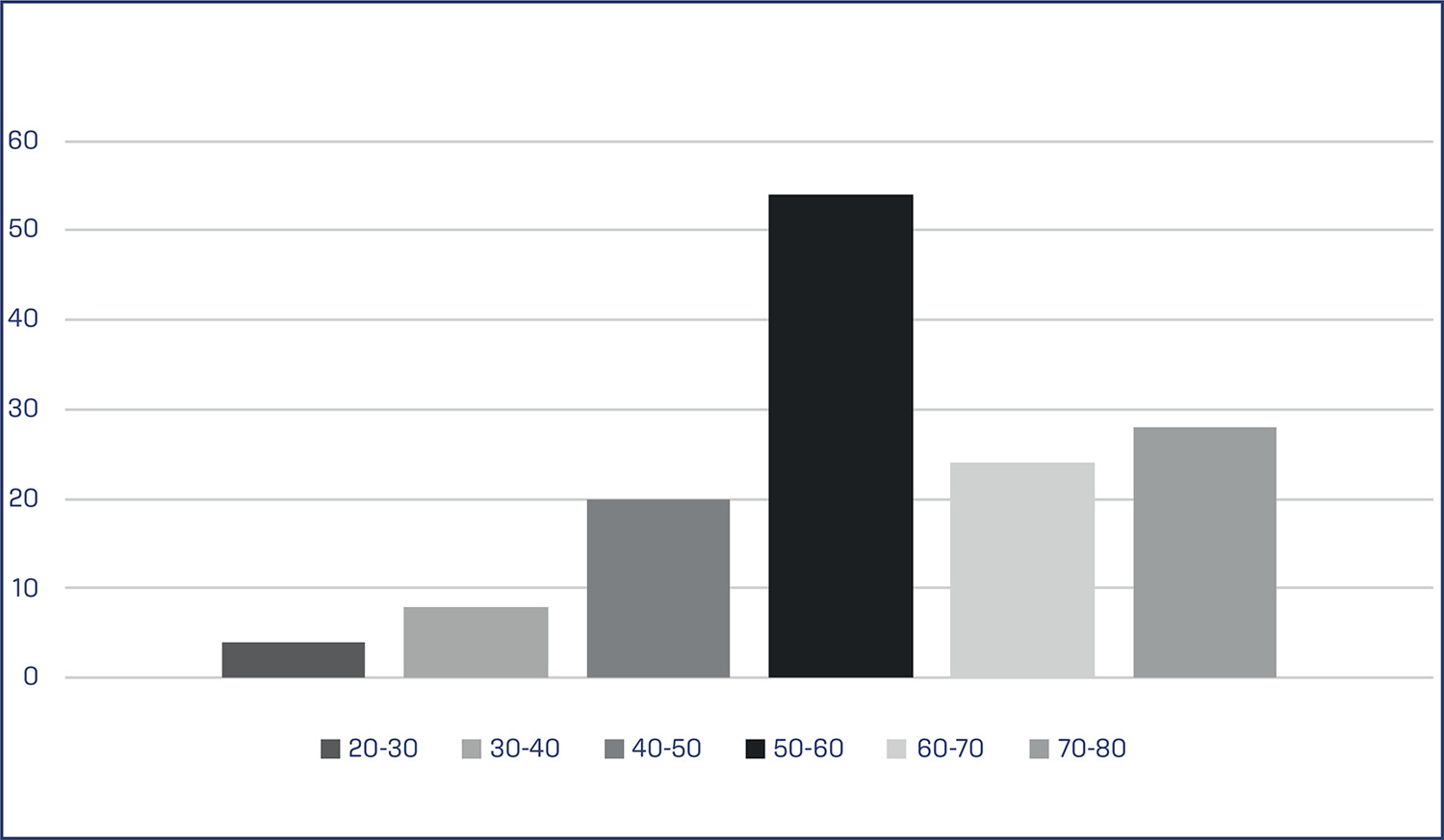
Summary
Revista Brasileira de Ginecologia e Obstetrícia. 2024;46:e-rbgo63
Management of suspect adnexal masses involves surgery to define the best treatment. Diagnostic choices include a two-stage procedure for histopathology examination (HPE) or intraoperative histological analysis – intraoperative frozen section (IFS) and formalin-fixed and paraffin-soaked tissues (FFPE). Preoperative assessment with ultrasound may also be useful to predict malignancy. We aimed at determining the accuracy of IFS to evaluate adnexal masses stratified by size and morphology having HPE as the diagnostic gold standard.
A retrospective chart review of 302 patients undergoing IFS of adnexal masses at Hospital de Clínicas de Porto Alegre, between January2005 and September2011 was performed. Data were collected regarding sonographic size (≤10cm or >10cm), characteristics of the lesion, and diagnosis established in IFS and HPE. Eight groups were studied: unilocular lesions; septated/cystic lesions; heterogeneous (solid/cystic) lesions; and solid lesions, divided in two main groups according to the size of lesion, ≤10cm or >10cm. Kappa agreement between IFS and HPE was calculated for each group.
Overall agreement between IFS and HPE was 96.1% for benign tumors, 96.1% for malignant tumors, and 73.3% for borderline tumors. Considering the combination of tumor size and morphology, 100% agreement between IFS and HPE was recorded for unilocular and septated tumors ≤10cm and for solid tumors.
Stratification of adnexal masses according to size and morphology is a good method for preoperative assessment. We should wait for final HPE for staging decision, regardless of IFS results, in heterogeneous adnexal tumors of any size, solid tumors ≤10cm, and all non-solid tumors >10cm.
Summary
Revista Brasileira de Ginecologia e Obstetrícia. 2024;46:e-rbgo65
Eclampsia is a hypertensive disorder that occurs during pregnancy and can lead to death. The literature has gaps by not providing comprehensive data on the epidemiology of the disease, restricting analysis to limited temporal intervals and geographical locations. This study aims to characterize the epidemiological profile of women who died from eclampsia in Brazil from 2000 to 2021.
The maternal mortality data were obtained from the Sistema de Informações sobre Mortalidade, with the following variables of interest selected: “Federative Unit,” “Year,” “Age Range,” “Race/Color,” and “Education Level.” The collection of the number of live births for data normalization was conducted in the Sistema de Informações sobre Nascidos Vivos. Statistical analyses were performed using GraphPad Prism, calculating odds ratio for variables and fixing number of deaths per 100,000 live births for calculating maternal mortality ratio (MMR).
There was a downward trend in maternal mortality rate during the study period. Maranhão stood out as the federative unit with the highest MMR (17 deaths per 100.000 live births). Mothers aged between 40 and 49 years (OR = 3.55, CI: 3.11–4.05) presents higher MMR. Additionally, black women showed the highest MMR (OR = 4.67, CI: 4.18–5.22), as well as mothers with no educational background (OR = 5.83, CI: 4.82–7.06).
The epidemiological profile studied is predominantly composed of mothers with little or no formal education, self-declared as Black, residing in needy states and with advanced aged. These data are useful for formulating public policies aimed at combating the issue.
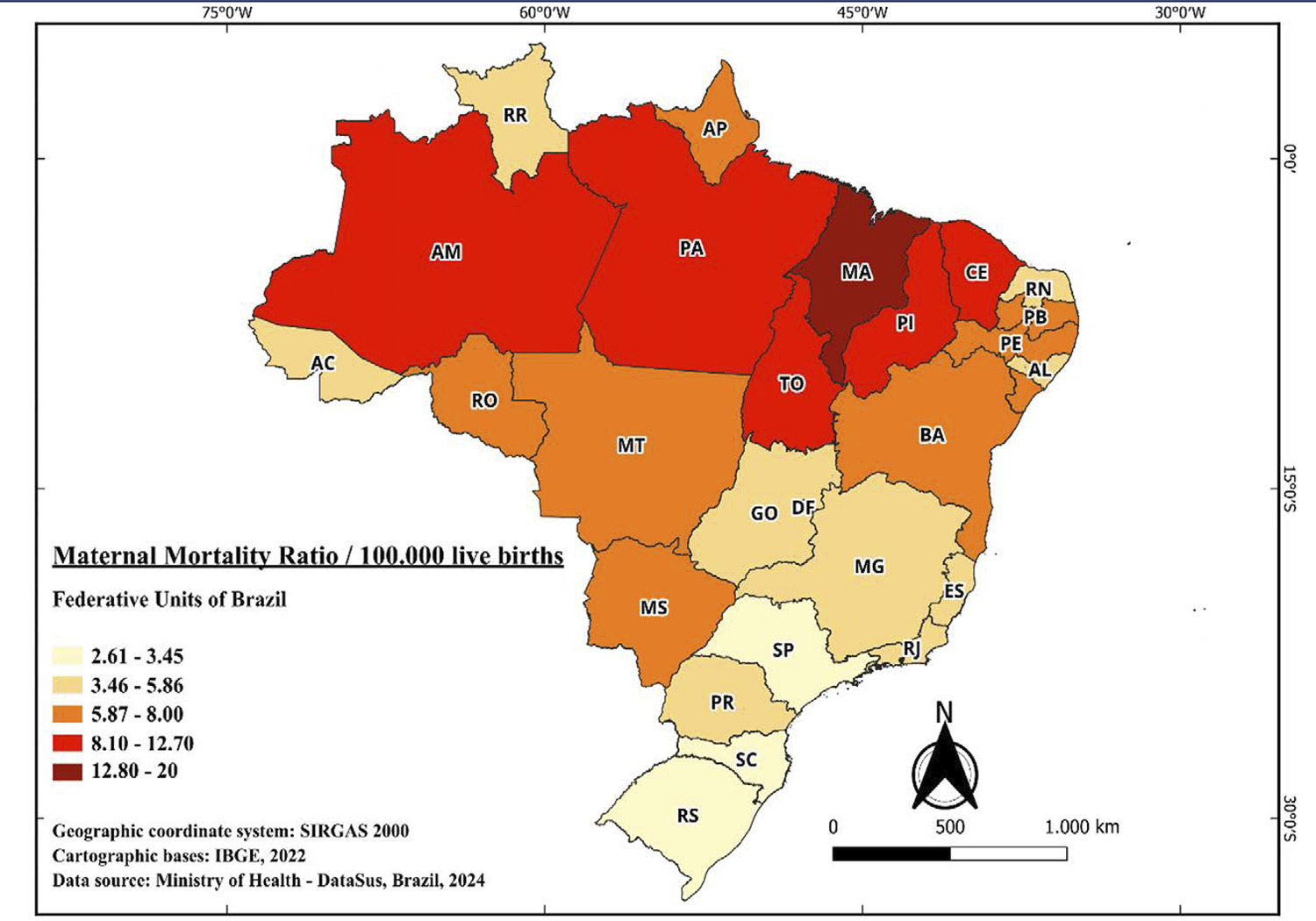
Summary
Revista Brasileira de Ginecologia e Obstetrícia. 2024;46:e-rbgo66
This study aimed to investigate the effects of the presence of subchorionic hematoma (SH) in early pregnancies with threatened miscarriage (TM) on levels of first-trimester maternal serum markers, pregnancy-associated plasma protein-A (PAPP-A), and free β-human chorionic gonadotropin (β-hCG) levels.
The data of TM cases with SH in the first trimester between 2015 and 2021 were evaluated retrospectively. The data of age and gestational age-matched TM cases without SH were also assessed to constitute a control group. Demographic characteristics, obstetric histories, ultrasonographic findings, and free β-hCG and PAPP-A levels of the groups were compared.
There were 119 cases in the study group and 153 cases in the control group. The median vertical and longitudinal lengths of the SH were 31 mm and 16 mm. The median age of both groups was similar (p=0.422). The MoM value of PAPP-A was 0.088 (.93) in the study group and 0.9 (0.63) in the control group (p=0.519). Similarly, the MoM value of free β-hCG was 1.04 (0.78) in the study group and 0.99 (0.86) in the control group (p=0.66). No significant relationship was found in the multivariate analysis between free β-hCG MoM, PAPP-A MoM, age, gravida, and vertical and longitudinal lengths of the hematoma (p>0.05).
The level of PAPP-A and free β-hCG were not affected by the SH. Therefore, these markers can be used reliably in TM cases with SH for the first-trimester fetal aneuploidy screening test.
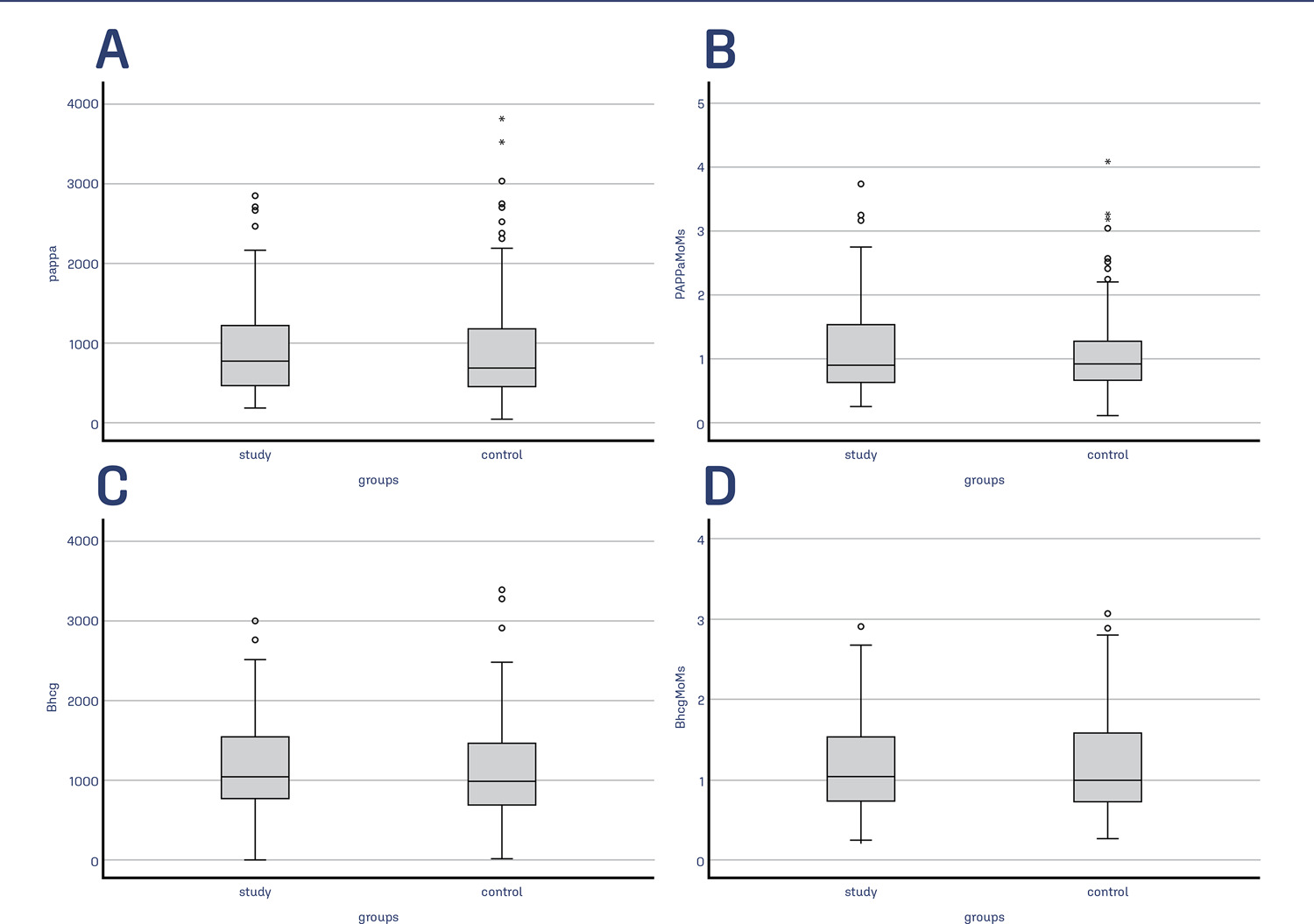
Summary
Revista Brasileira de Ginecologia e Obstetrícia. 2024;46:e-rbgo51
To assess the prevalence and type of chromosomal abnormalities in Brazilian couples with recurrent pregnancy loss (RPL) and compare the clinical characteristics of couples with and without chromosome abnormalities.
We assessed the medical records of 127 couples with a history of two or more miscarriages, referred to a tertiary academic hospital in Belo Horizonte, Brazil, from January 2014 to May 2023. Karyotype was generated from peripheral blood lymphocyte cultures, and cytogenetic analysis was performed according to standard protocols by heat-denatured Giemsa (RHG) banding.
Abnormal karyotypes were detected in 10 couples (7.8%). The prevalence of chromosomal abnormalities was higher among females (6.3%) compared to males (2.0%), but this difference was not statistically significant (p=0.192). The mean number of miscarriages was. 3.3 ± 1.1 in couples with chromosome abnormalities and 3.1 ± 1.5 in couples without chromosome abnormalities (p=0.681). Numerical chromosomal anomalies (6 cases) were more frequent than structural anomalies. Four women presented low-grade Turner mosaicism. No differences were found between couples with and without karyotype alterations, except for maternal age, which was higher in the group with chromosome alterations.
The prevalence of parental chromosomal alterations in our study was higher than in most series described in the literature and was associated with increased maternal age. These findings suggest that karyotyping should be part of the investigation for Brazilian couples with RPL, as identifying the genetic etiology may have implications for subsequent pregnancies.
Summary
Revista Brasileira de Ginecologia e Obstetrícia. 2024;46:e-rbgo53
To evaluate the risk factors for postpartum hemorrhage (PPH) according to the Robson Classification in a low-risk maternity hospital.
We conducted retrospective cohort study by analyzing the medical records of pregnant women attended in a low-risk maternity hospital, during from November 2019 to November 2021. Variables analyzed were: maternal age, type of delivery, birth weight, parity, Robson Classification, and causes of PPH. We compared the occurrence of PPH between pregnant women with spontaneous (Groups 1 and 3) and with induction of labor (2a and 4a). Chi-square and Student t-tests were performed. Variables were compared using binary logistic regression.
There were 11,935 deliveries during the study period. According to Robson’s Classification, 48.2% were classified as 1 and 3 (Group I: 5,750/11,935) and 26.1% as 2a and 4a (Group II: 3,124/11,935). Group II had higher prevalence of PPH than Group I (3.5 vs. 2.7%, p=0.028). Labor induction increased the occurrence of PPH by 18.8% (RR: 1.188, 95% CI: 1.02-1.36, p=0.030). Model including forceps delivery [x2(3)=10.6, OR: 7.26, 95%CI: 3.32-15.84, R2 Nagelkerke: 0.011, p<0.001] and birth weight [x2(4)=59.0, OR: 1.001, 95%CI:1.001-1.001, R2 Nagelkerke: 0.033, p<0.001] was the best for predicting PPH in patients classified as Robson 1, 3, 2a, and 4a. Birth weight was poor predictor of PPH (area under ROC curve: 0.612, p<0.001, 95%CI: 0.572-0.653).
Robson Classification 2a and 4a showed the highest rates of postpartum hemorrhage. The model including forceps delivery and birth weight was the best predictor for postpartum hemorrhage in Robson Classification 1, 3, 2a, and 4a.
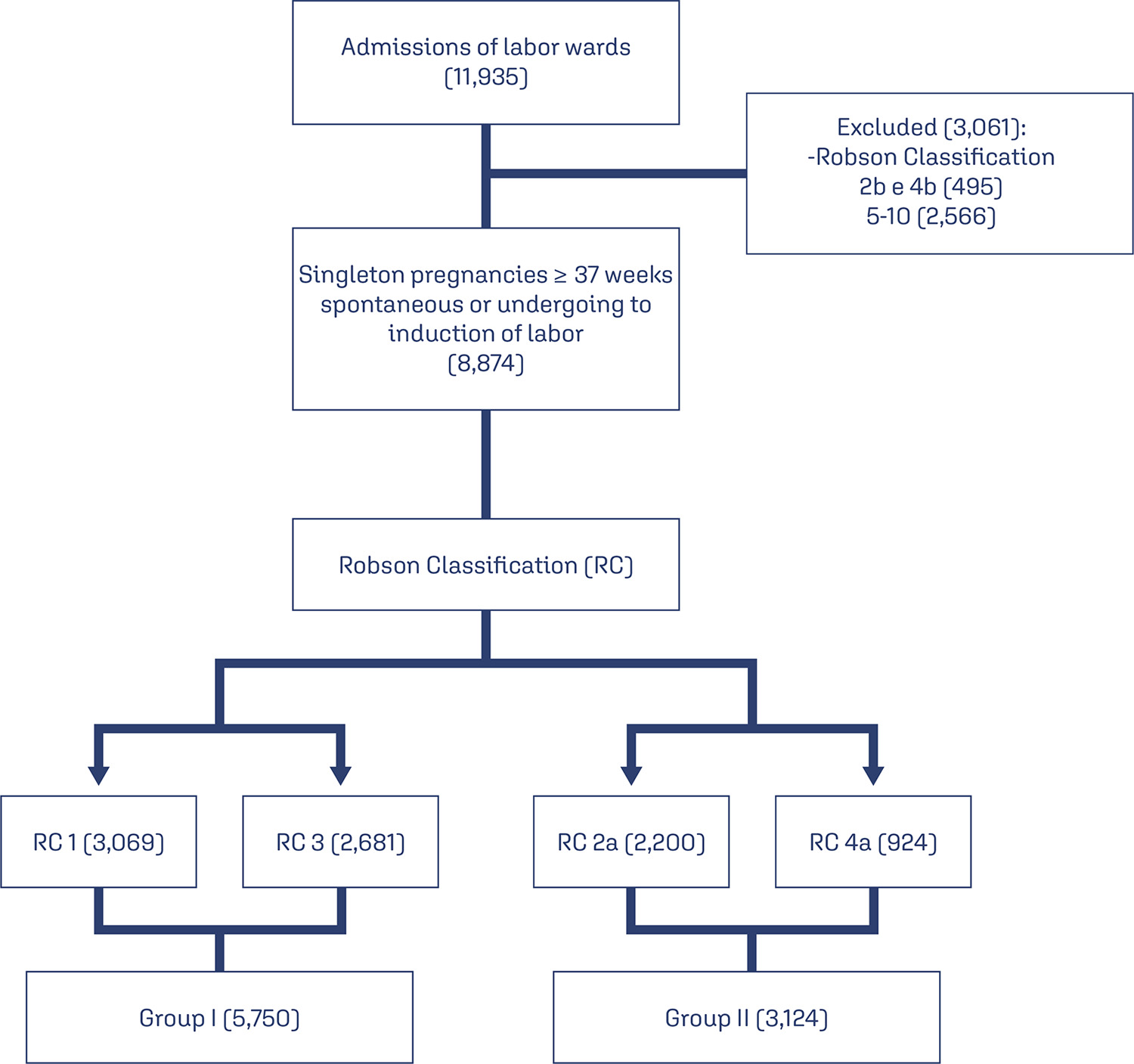
Summary
Revista Brasileira de Ginecologia e Obstetrícia. 2024;46:e-rbgo42
To evaluate the effects of surgical treatment of deep endometriosis on the metabolic profile, quality of life and psychological aspects.
Prospective observational study, carried out with women of reproductive age diagnosed with deep endometriosis, treated in a specialized outpatient clinic, from October/2020 to September/2022, at a University Hospital in Fortaleza - Brazil. Standardized questionnaires were applied to collect data on quality of life and mental health, in addition to laboratory tests to evaluate dyslipidemia and dysglycemia, at two moments, preoperatively and six months after surgery. The results were presented using tables, averages and percentages.
Thirty women with an average age of 38.5 years were evaluated. Seven quality of life domains showed improved scores: pain, control and impotence, well-being, social support, self-image, work life and sexual relations after surgery (ES ≥ 0.80). There was an improvement in mental health status with a significant reduction in anxiety and depression postoperatively. With the metabolic profile, all average levels were lower after surgery: total cholesterol 8.2% lower, LDL 12.8% lower, triglycerides 10.9% lower, and fasting blood glucose 7.3% lower (p < 0.001).
Surgical treatment of deep endometriosis improved the quality of life and psychological aspects of patients. The lipid profile of patients after laparoscopy was favorable when compared to the preoperative lipid profile.